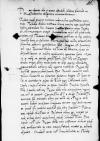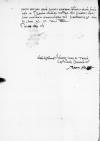Quam quod propter veterem nostram ac bene constitutam amicitiam Reverendissimam Dominationem Vestram litteris invisere saepe constitutum habui, maxume hoc tempore facerem, servitor meus Jacob Allexwangen Jr ⌊Iacobus ab AllexwangenJacob Allexwangen Jr ⌋ oravit. Quam ob rem nihil est, quod aeque cupiam, nisi Reverendissimam Dominat paper damaged⌈[minat]minat paper damaged⌉ionem Vestram in hac corporis senecta bene et feliciter valere, quae quam multis adimere, ita pluribus afferre aegritudinem solet.
Magna est Jacob Allexwangen Jr ⌊servitorisJacob Allexwangen Jr ⌋ nostri erga Reverendissimam Dominationem Vestram observantia, quam non dissimulanter et multis argumentis cognitam habeo. Qua re a nobis in Royal Prussia (Prussia Regalis), region, part of Prussia annexed to the Kingdom of Poland in 1466 under the provisions of the Second Peace of Thorn⌊patriamRoyal Prussia (Prussia Regalis), region, part of Prussia annexed to the Kingdom of Poland in 1466 under the provisions of the Second Peace of Thorn⌋ profecturum sine litteris ad Reverendissimam Dominationem Vestram abire nolui, quin ut aliis amicis observandis commendatum adeoque eius negotia reddidi. Reverendissimae Dominationi Vestrae commendatissimus esset.
Deinde amanter oratam, velim, clementiam ac usitatam pietatem benigne Jacob Allexwangen Jr ⌊illiJacob Allexwangen Jr ⌋ locare velit in controversia, quam de ecclesia pagi Grosse Lichtenau (Lichnowy), village in Ermland⌊LichtenauGrosse Lichtenau (Lichnowy), village in Ermland⌋ habet, cuius exspectationem ac spem terrarum Prussiae spectabilis Council of Royal Prussia the most important local authority in Royal Prussia. It consisted of two bishops (of Ermland (Warmia), who served as the Council’s president, and of Kulm (Chełmno)), three voivodes (of Kulm, Marienburg (Malbork), and Pomerania), three castellans (of Kulm, Elbing (Elbląg), and Gdańsk (Danzig)), three chamberlains (of Kulm, Marienburg, and Pomerania), and representatives of the three Great Prussian Cities – Gdańsk, Thorn (Toruń), and Elbing (ACHREMCZYK 2016, p. 17-18)⌊senatusCouncil of Royal Prussia the most important local authority in Royal Prussia. It consisted of two bishops (of Ermland (Warmia), who served as the Council’s president, and of Kulm (Chełmno)), three voivodes (of Kulm, Marienburg (Malbork), and Pomerania), three castellans (of Kulm, Elbing (Elbląg), and Gdańsk (Danzig)), three chamberlains (of Kulm, Marienburg, and Pomerania), and representatives of the three Great Prussian Cities – Gdańsk, Thorn (Toruń), and Elbing (ACHREMCZYK 2016, p. 17-18)⌋ adeoque Reverendissimae Dominationis Vestrae intercessione ingressus est et accepit. Conquestus est a magnifico Stanisław Kostka (*1487 – †1555), as a leader of the so-called nobles' party active in Royal Prussia since 1536, Kostka stood in opposition to most of the members of the Council of Royal Prussia, who wanted to maintain the autonomy of the province and a "balance of power" in terms of governance. The tension between the Prussian Subtreasurer and the Council had been increasing since the Diet in Graudenz (Grudziądz) in 1533. Kostka, connected with the royal court since his youth, was sent to Graudenz as the King's deputy and, contrary to custom, decided to take part in the proceedings. In response to such a step, the Council members stopped the meeting. Kostka accused them of hostility towards the Poles and intervened on this matter at the court. In the absence of the then Bishop of Ermland (Mauritius Ferber) it was Dantiscus who chaired the Graudenz Diet. The incident badly harmed his future relationships with Kostka; 1531-1555 Treasurer of the Prussian lands and Treasurer of Marienburg (Malbork); 1544-1545 Castellan of Elbing (Elbląg), 1545-1546 Castellan of Kulm (Chełmno); 1546-1549 Vice-Voivode of Kulm; 1546-1551 Voivode of Pomerania; 1551-1555 Voivode of Kulm (PSB 14, p. 356; Urzędnicy 5/2, p. 216; MAŁŁEK 1976, p. 119-123)⌊palatino PomeraniaeStanisław Kostka (*1487 – †1555), as a leader of the so-called nobles' party active in Royal Prussia since 1536, Kostka stood in opposition to most of the members of the Council of Royal Prussia, who wanted to maintain the autonomy of the province and a "balance of power" in terms of governance. The tension between the Prussian Subtreasurer and the Council had been increasing since the Diet in Graudenz (Grudziądz) in 1533. Kostka, connected with the royal court since his youth, was sent to Graudenz as the King's deputy and, contrary to custom, decided to take part in the proceedings. In response to such a step, the Council members stopped the meeting. Kostka accused them of hostility towards the Poles and intervened on this matter at the court. In the absence of the then Bishop of Ermland (Mauritius Ferber) it was Dantiscus who chaired the Graudenz Diet. The incident badly harmed his future relationships with Kostka; 1531-1555 Treasurer of the Prussian lands and Treasurer of Marienburg (Malbork); 1544-1545 Castellan of Elbing (Elbląg), 1545-1546 Castellan of Kulm (Chełmno); 1546-1549 Vice-Voivode of Kulm; 1546-1551 Voivode of Pomerania; 1551-1555 Voivode of Kulm (PSB 14, p. 356; Urzędnicy 5/2, p. 216; MAŁŁEK 1976, p. 119-123)⌋ sibi praereptam alteri, qui nullum ius a regia maiestate acceptum habuit, concessam. Benignam operam, rogo, interponat, ne quid Jacob Allexwangen Jr ⌊illiJacob Allexwangen Jr ⌋ iniuriae accidat, suo iure fraudetur. Piotrków (Petricovia), city in central Poland, in the 15th-16th century the location of the assemblies of the Diet (Sejm) of the Kingdom of Poland, today Piotrków Trybunalski⌊PiotrcoviaePiotrków (Petricovia), city in central Poland, in the 15th-16th century the location of the assemblies of the Diet (Sejm) of the Kingdom of Poland, today Piotrków Trybunalski⌋ apud dictum dominum Stanisław Kostka (*1487 – †1555), as a leader of the so-called nobles' party active in Royal Prussia since 1536, Kostka stood in opposition to most of the members of the Council of Royal Prussia, who wanted to maintain the autonomy of the province and a "balance of power" in terms of governance. The tension between the Prussian Subtreasurer and the Council had been increasing since the Diet in Graudenz (Grudziądz) in 1533. Kostka, connected with the royal court since his youth, was sent to Graudenz as the King's deputy and, contrary to custom, decided to take part in the proceedings. In response to such a step, the Council members stopped the meeting. Kostka accused them of hostility towards the Poles and intervened on this matter at the court. In the absence of the then Bishop of Ermland (Mauritius Ferber) it was Dantiscus who chaired the Graudenz Diet. The incident badly harmed his future relationships with Kostka; 1531-1555 Treasurer of the Prussian lands and Treasurer of Marienburg (Malbork); 1544-1545 Castellan of Elbing (Elbląg), 1545-1546 Castellan of Kulm (Chełmno); 1546-1549 Vice-Voivode of Kulm; 1546-1551 Voivode of Pomerania; 1551-1555 Voivode of Kulm (PSB 14, p. 356; Urzędnicy 5/2, p. 216; MAŁŁEK 1976, p. 119-123)⌊palatinumStanisław Kostka (*1487 – †1555), as a leader of the so-called nobles' party active in Royal Prussia since 1536, Kostka stood in opposition to most of the members of the Council of Royal Prussia, who wanted to maintain the autonomy of the province and a "balance of power" in terms of governance. The tension between the Prussian Subtreasurer and the Council had been increasing since the Diet in Graudenz (Grudziądz) in 1533. Kostka, connected with the royal court since his youth, was sent to Graudenz as the King's deputy and, contrary to custom, decided to take part in the proceedings. In response to such a step, the Council members stopped the meeting. Kostka accused them of hostility towards the Poles and intervened on this matter at the court. In the absence of the then Bishop of Ermland (Mauritius Ferber) it was Dantiscus who chaired the Graudenz Diet. The incident badly harmed his future relationships with Kostka; 1531-1555 Treasurer of the Prussian lands and Treasurer of Marienburg (Malbork); 1544-1545 Castellan of Elbing (Elbląg), 1545-1546 Castellan of Kulm (Chełmno); 1546-1549 Vice-Voivode of Kulm; 1546-1551 Voivode of Pomerania; 1551-1555 Voivode of Kulm (PSB 14, p. 356; Urzędnicy 5/2, p. 216; MAŁŁEK 1976, p. 119-123)⌋ idem egi, recepit se Jacob Allexwangen Jr ⌊eiusJacob Allexwangen Jr ⌋ rebus iterum consulturum, quod lubenter fieri superinscribed⌈fierifieri superinscribed⌉ velim. Praecipuum est, cur Reverendissima Dominatio Vestra sustinere debeat, quod eius auctoritate in eam exspectationem renitit(?) ac colende observet.
Quod meae est benevolentiae ac studii,  AAWO, AB, D. 9, f. 26v parem amicam operam, ferente occasione, lubenter iterum declarabo. Ac Reverendissimam Dominationem Vestram Deo Servatori diutissime incolumem commendatam volo.
AAWO, AB, D. 9, f. 26v parem amicam operam, ferente occasione, lubenter iterum declarabo. Ac Reverendissimam Dominationem Vestram Deo Servatori diutissime incolumem commendatam volo.
 AAWO, AB, D. 9, f. 1 unnumbered after f. 26
AAWO, AB, D. 9, f. 1 unnumbered after f. 26  AAWO, AB, D. 9, f. 26v parem amicam operam, ferente occasione, lubenter iterum declarabo. Ac Reverendissimam Dominationem Vestram Deo Servatori diutissime incolumem commendatam volo.
AAWO, AB, D. 9, f. 26v parem amicam operam, ferente occasione, lubenter iterum declarabo. Ac Reverendissimam Dominationem Vestram Deo Servatori diutissime incolumem commendatam volo.


